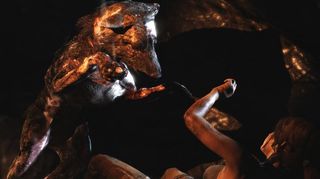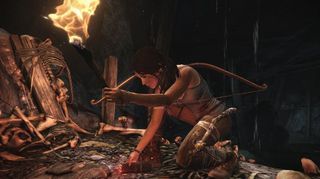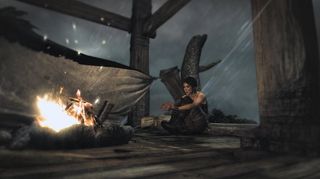Tomb Raider Preview

Apparently, Tomb Raider: Legend wasn't the reboot we all thought it was. It looked like one, it played like one and, if you were creepy enough to check, it even smelled like one. But according to developer Crystal Dynamics, it was merely their interpretation of the series as it was back in 2006. Instead, 2011's Tomb Raider is the game that's meant to totally reinvent the franchise. A new start, if you will. Lara Croft without the cruft.
The most obvious change to the status quo is that Lara is now much younger, and yet to become the pistol-packing, one-woman extinction event for endangered wildlife and ancient gods that we all know and lust after. Rather than being an explorer, she's a survivor, trapped on a mysterious island with more than a little Lost in its stones. She's fighting to escape the dark tombs and traps, as opposed to confidently charging in to relieve them of their buried treasure.

This isn't the first time that the Tomb Raider series has tried going down the 'darker and edgier' route, although it does look like a far more accomplished attempt than original creator Core's final offering, The Angel of Darkness. (That sound you just heard was Tomb Raider fans everywhere shivering in horror.) Rather than simply updating the look and bolting on a few extra systems, Crystal are putting as much effort into expanding the central mechanics as reinventing the character. Where previous Tomb Raider games took a pure, level-by-level approach, this one offers a more open world; the classic Metroidvania style of linked hubs, each locked off until you find the right piece of equipment or way to sneak inside.
In real terms, what this means is that the whole island is available for raiding, but you'll have to work to get that far – a mountain in the distance might be climbable, but only when you get your hands on a pick. However, even in the more limited hubs, there's some freedom to go off the path and explore the scenery instead of just making a beeline from A to B. Lara now has a special 'instinct' mode, much like Batman's detective vision in Arkham Asylum. This will highlight things such as wolf tracks and important bits of scenery. It's not an open world in the same way as Assassin's Creed or Grand Theft Auto, but it still promises to be considerably more liberating than simply walking from corridor to puzzle and back again for ten hours straight.

A lot of this reboot can be attributed to two things: Tomb Raider: Underworld underperforming on the shelves, and the success of competing franchises on console systems, particularly the Uncharted series on PlayStation 3. While it was a solid game, there's no arguing that Underworld felt old and static compared to fresher, more cinematic titles. In fact, it's amazing that the dusty old 'Tomb Raider' name is staying, while the much more flexible 'Lara Croft' got assigned to games such as last year's Guardian of Light.
One of the ways in which this Tomb Raider hopes to fight back is with more physical puzzles, offering ways to play with fire and water and the laws of physics rather than simply dragging crates onto buttons. One demoed puzzle involves finding a way of getting burning oil drums to destroy a blockage without them being extinguished by the water all around – a trick involving jury-rigged levers, floating crates and a little lateral thinking. The goal is that, while these things are placed into the environment for specific reasons, they should feel like natural obstacles to work around, not traditional puzzles with a single fixed solution.

That just leaves combat, which remains something of a mystery. Lara's pistols are as iconic a part of her character as her long ponytail, but we've yet to see her really cut loose against the wolves and other nasties standing between her and escape. Early demos haven't shown much fighting at all, focusing far more on sudden, up-close and, above all, sparse acts of violence. This could be a sign that, this time, Tomb Raider wants to make Lara killing things feel like big events, instead of having her climbing constantly over packs of tiger corpses to steal some ancient culture's trinkets. Or simply that the combat isn't yet ready to strut its stuff.
The biggest gaming news, reviews and hardware deals
Keep up to date with the most important stories and the best deals, as picked by the PC Gamer team.
I hope it's the first case. No Tomb Raider game has ever been improved by its combat, outside of setpieces like the first game's T-Rex attack. Action is important, and this reboot needs plenty of it, but I'd much prefer the focus to stay on the new exploration, survival and seductively dark atmosphere, not shoehorned-in shooting for the sake of ticking a box.
Tomb Raider doesn't just have to be a great game, it has to be one that reignites the world's excitement for Lara Croft's adventures. Simply making everything darker and edgier is no guarantee of success. However, if the series-saving Legend wasn't even Crystal Dynamics trying to do a proper reboot, I can't wait to see what happens when they get serious.

Amazon's Mass Effect TV show now in 'active development' from the writer of F9: The Fast Saga (the one where a car goes to space)

Take-Two CEO says Grand Theft Auto 6 is on track for 'fall' next year, GTA 5 has sold over 205 million, and 'PC will be more and more a part of [our] business going forward'
Most Popular

